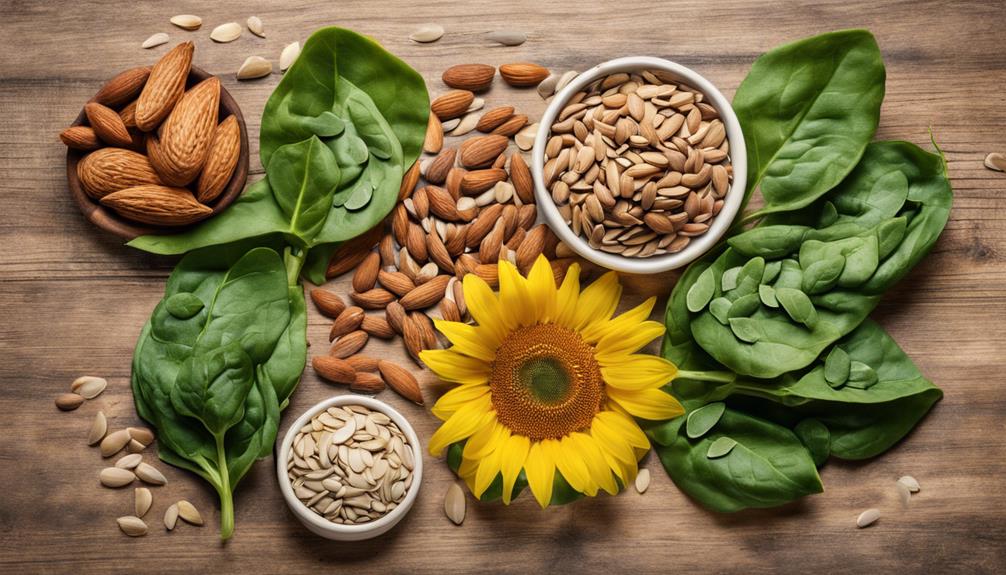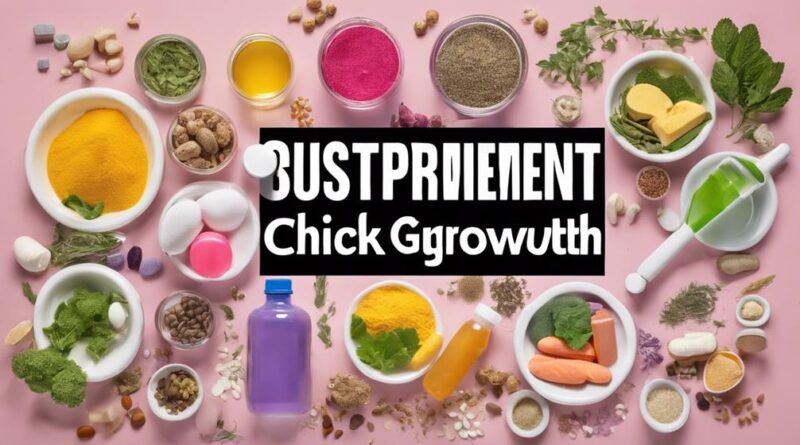Top 7 Supplements for Optimal Chick Growth"
Maximize your chicks' growth potential with these key supplements: Vitamin D3, essential for bone strength and calcium regulation; Probiotics, boosting digestion and immunity; Omega-3 Fatty Acids, supporting overall health and immune function; Calcium Supplements, crucial for bone development and preventing skeletal issues; Essential Amino Acids, promoting muscle and organ growth; Iron Supplements, aiding in oxygen transport and enzyme functions; Vitamin E, vital for growth, immunity, and skin health. Ensure optimal chick growth by providing these essential supplements tailored to their development and overall well-being.
Vitamin D3
To ensure optimal growth in your chicks, supplementing their diet with Vitamin D3 is essential for promoting bone development and overall health. Vitamin D3 plays a crucial role in maintaining healthy bones by aiding in the absorption of calcium and phosphorus. One of the primary sources of Vitamin D3 is sun exposure. When your chicks are exposed to sunlight, their skin synthesizes Vitamin D3, which is then converted to its active form in the liver and kidneys. This active form of Vitamin D3 helps regulate calcium and phosphorus levels in the blood, supporting bone mineralization and growth.
In addition to sun exposure, dietary sources of Vitamin D3 are also essential for your chicks' growth and immunity. Including foods like fortified grains, fish oil, and egg yolks in their diet can ensure an adequate intake of Vitamin D3. Proper levels of Vitamin D3 are crucial for the functioning of the immune system. It helps in the production of antimicrobial peptides that aid in fighting infections and maintaining overall health in your chicks.
Ensuring your chicks receive sufficient Vitamin D3 through both sun exposure and dietary sources is vital for promoting bone health, immunity, and overall growth. By incorporating Vitamin D3 into their diet, you're providing them with a strong foundation for healthy development.
Probiotics
Supplementing your chicks' diet with probiotics can enhance their digestive health and support a balanced gut microbiome, crucial for optimal growth and immunity. Probiotics are beneficial bacteria that can help maintain gut health by promoting digestive balance. The digestive system of chicks, like that of all animals, plays a vital role in overall health. Probiotics work by restoring the natural balance of good bacteria in the gut, which can be disrupted by factors such as stress, illness, or dietary changes.
When chicks have a healthy gut microbiome, they're better equipped to digest and absorb nutrients from their feed, leading to improved growth and development. Additionally, probiotics can help strengthen the immune system, making chicks more resilient to common infections and diseases. By supporting a balanced gut microbiome, probiotics contribute to the overall well-being of your chicks.
Introducing probiotics to your chicks' diet is a practical and effective way to promote gut health and digestive balance. You can find probiotic supplements specifically formulated for poultry, making it easy to incorporate them into your chicks' feeding routine. Remember to follow the recommended dosage instructions to ensure the optimal benefits of probiotics for your growing chicks. Prioritizing gut health through probiotic supplementation is a proactive step towards supporting the growth and vitality of your flock.
Omega-3 Fatty Acids
Enhancing your chicks' diet with Omega-3 fatty acids can play a significant role in promoting their overall health and growth. Omega-3 fatty acids are essential nutrients that support brain development, improve feather quality, and boost immune function in chicks. One of the most common sources of Omega-3 fatty acids is fish oil. Fish oil benefits chicks by providing them with docosahexaenoic acid (DHA) and eicosapentaenoic acid (EPA), which are crucial for neurological development and overall health. Including fish oil in your chicks' diet can lead to better growth rates and improved resistance to diseases.
Apart from fish oil, Omega-3 fatty acids can also be derived from various plant sources such as flaxseeds, chia seeds, and walnuts. These plant-based sources offer alpha-linolenic acid (ALA), which can be converted into DHA and EPA in small amounts by the chicks' bodies. While not as potent as fish oil, incorporating plant-based sources of Omega-3 fatty acids can still provide valuable health benefits to your chicks.
To ensure that your chicks receive an adequate amount of Omega-3 fatty acids, consider adding fish oil supplements or plant-based sources to their feed. This simple addition to their diet can have a profound impact on their growth, development, and overall well-being.
Calcium Supplements
Incorporating calcium supplements into your chicks' diet is essential for supporting their bone development and overall health. Calcium is a vital mineral that plays a crucial role in the formation and maintenance of strong bones in growing chicks. One excellent source of calcium is eggshell calcium, which can be ground into a fine powder and added to your chicks' feed.
Calcium is particularly important for young chicks as they're rapidly growing and developing. It's essential for the formation of growth platelets, which are responsible for bone lengthening and growth. Ensuring an adequate supply of calcium in your chicks' diet can help prevent skeletal problems and deformities that may arise due to calcium deficiency.
When supplementing calcium, it's crucial to provide the right amount. Too little calcium can lead to weak bones and developmental issues, while too much calcium can interfere with the absorption of other essential minerals. It's recommended to follow guidelines provided by poultry nutritionists or veterinarians to determine the appropriate dosage for your chicks based on their age and breed.
Essential Amino Acids
To support optimal chick growth and development, ensuring a sufficient intake of essential amino acids is key. Essential amino acids are the building blocks of proteins, which are crucial for various physiological processes in growing chicks. Protein sources rich in essential amino acids include soybean meal, fish meal, and poultry by-product meal. These protein sources provide a balanced profile of amino acids necessary for chick growth and development.
Essential amino acids play a vital role in the synthesis of growth factors, which are molecules that regulate cellular growth and proliferation. By consuming adequate amounts of essential amino acids, chicks can support the production of growth factors essential for muscle development, organ growth, and overall body maintenance. Without a proper intake of essential amino acids, chicks may experience stunted growth and development delays.
Incorporating protein sources rich in essential amino acids into your chick's diet is essential for promoting optimal growth. Ensure that your chicks have access to high-quality feeds that contain the necessary amino acids for their developmental needs. By providing the right balance of essential amino acids, you can support healthy growth, improve feed efficiency, and enhance overall chick performance. Remember, essential amino acids are fundamental for maximizing chick growth potential and achieving desired production outcomes.
Iron Supplements
Adequate iron intake is crucial for supporting optimal chick growth and development. Iron is essential for various biological processes, including oxygen transport, enzyme function, and DNA synthesis. In young chicks, iron plays a critical role in growth and development, making it a vital supplement to consider. Iron absorption is a key factor to ensure that chicks are benefiting from this mineral. Factors such as the type of iron source, interactions with other nutrients, and overall health status can influence iron absorption in chicks.
To promote proper growth development, it's important to provide chicks with iron-rich supplements or fortified feeds. Iron supplements can come in various forms, including ferrous sulfate, ferrous carbonate, and ferrous fumarate. These supplements can help meet the iron requirements of growing chicks, ensuring they have the necessary levels for optimal development. Monitoring iron levels in the diet and adjusting supplementation accordingly is crucial to prevent deficiencies that can hinder growth and overall health.
Incorporating iron supplements into the chick's diet should be done with care and under the guidance of a poultry nutritionist or veterinarian. Excessive iron levels can also be harmful, leading to toxicity and negative health effects. By understanding the importance of iron absorption and providing the right supplements, you can support the growth and development of your chicks effectively.
Vitamin E

For the optimal growth and development of your chicks, ensuring they receive adequate Vitamin E is vital. Vitamin E is a crucial nutrient that plays a significant role in supporting the overall health of your chicks.
One of the key benefits of Vitamin E is its antioxidant properties. As an antioxidant, Vitamin E helps protect cells from damage caused by free radicals, which are unstable molecules that can harm cells and contribute to various health issues. By providing your chicks with Vitamin E, you can help safeguard their cells and promote their growth and development.
In terms of growth development, Vitamin E is essential for chicks as it supports their immune system and helps maintain healthy skin and eyes. Vitamin E deficiency can lead to poor growth, muscle weakness, and an increased susceptibility to infections. By incorporating Vitamin E into your chicks' diet, you can help ensure that they grow and develop properly.
To make sure your chicks are getting enough Vitamin E, consider providing them with a balanced feed that includes this essential nutrient. Additionally, you can consult with a veterinarian to determine the appropriate dosage of Vitamin E for your chicks based on their specific needs. Overall, Vitamin E is a valuable supplement that can contribute to the optimal growth and development of your chicks.
Frequently Asked Questions
Can I Mix Different Supplements Together for My Chicks?
Yes, you can mix different supplements for your chicks. When combining supplements, ensure you follow recommended dosage timing to avoid overloading their system. Mixing options provide a balanced intake of essential nutrients.
Remember to adhere to proper dosage frequency as excessive amounts can be harmful. By carefully selecting and combining supplements, you can support your chicks' growth and overall health effectively.
How Often Should I Adjust the Dosage of These Supplements?
When it comes to growth monitoring for your chicks, adjusting the dosage of supplements is crucial. Keep an eye on their development and make changes accordingly.
Ensure to consider supplement interactions and timing when adjusting dosages. Regularly review their progress to determine if any adjustments are needed.
Are These Supplements Suitable for All Chick Breeds?
Yes, these supplements are generally suitable for all chick breeds. However, some breed-specific supplements may cater better to certain types.
It's important to monitor growth rate and adjust dosage accordingly. Supplement combinations can also play a role in optimizing growth.
Keep an eye on your chicks' development and consult with a poultry expert for personalized advice on which supplements are best for your specific breed.
Can I Find These Supplements at Local Pet Stores?
You can find these supplements at local pet stores, but online options might offer a wider selection. Availability can vary, so check with different stores.
Consider price comparison and brand quality when deciding where to purchase. Some online retailers may offer better deals or carry specific brands not found in physical stores.
Research thoroughly to ensure you're getting the best value for your money while meeting your chick's nutritional needs.
Are There Any Potential Side Effects of These Supplements for Chicks?
When considering supplements for chicks, it's crucial to note potential risks and overdose concerns. Certain supplements, if not administered properly, can have adverse health implications on chicks. Overdosing may lead to growth effects and other negative consequences.
It's essential to follow dosage instructions carefully and consult with a veterinarian or poultry expert to ensure the well-being and optimal growth of your chicks.
Conclusion
In conclusion, providing chicks with the right supplements is crucial for optimal growth and development.
Vitamin D3 supports bone health, probiotics aid in digestion, omega-3 fatty acids promote brain development, calcium is essential for strong bones, essential amino acids support muscle growth, iron is necessary for oxygen transport, and vitamin E acts as an antioxidant.
By incorporating these supplements into their diet, you can ensure that your chicks grow healthy and strong.
